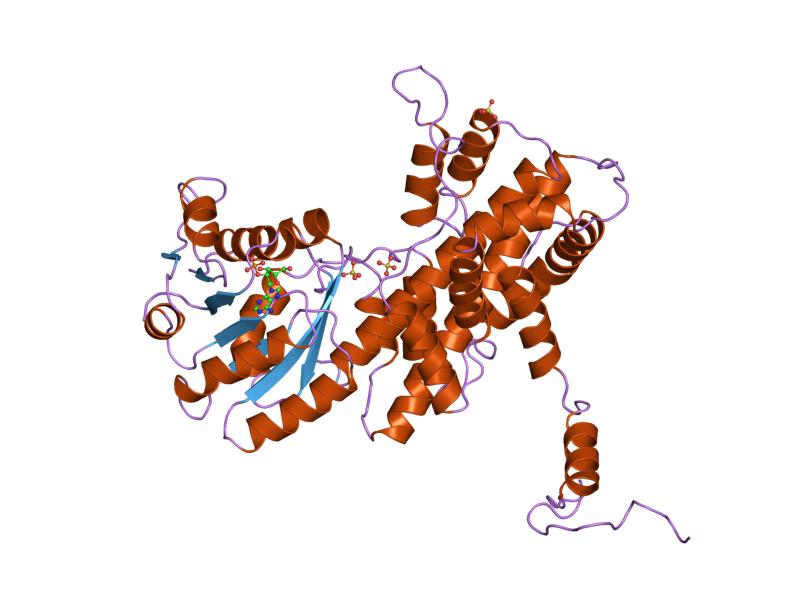6-phosphogluconate dehydrogenase deficiency
| 6-Phosphogluconate dehydrogenase deficiency | |
|---|---|

| |
| Synonyms | 6PGD deficiency |
| Pronounce | N/A |
| Specialty | N/A |
| Symptoms | Hemolytic anemia, jaundice, fatigue |
| Complications | Chronic hemolytic anemia |
| Onset | Varies |
| Duration | Lifelong |
| Types | N/A |
| Causes | Genetic mutation in the 6-phosphogluconate dehydrogenase gene |
| Risks | Family history |
| Diagnosis | Blood test, genetic testing |
| Differential diagnosis | Glucose-6-phosphate dehydrogenase deficiency, Pyruvate kinase deficiency |
| Prevention | None |
| Treatment | Avoidance of triggers, blood transfusion |
| Medication | None specific |
| Prognosis | Variable, generally good with management |
| Frequency | Rare |
| Deaths | N/A |
6-Phosphogluconate dehydrogenase deficiency is a rare metabolic disorder that affects the pentose phosphate pathway, specifically the oxidative phase. This deficiency is due to a lack of the enzyme 6-phosphogluconate dehydrogenase, which plays a crucial role in the conversion of 6-phosphogluconate to ribulose 5-phosphate.
Pathophysiology[edit | edit source]
The pentose phosphate pathway is essential for the production of NADPH and ribose 5-phosphate. NADPH is crucial for biosynthetic reactions and for maintaining the redox state of cells by regenerating glutathione. In 6-phosphogluconate dehydrogenase deficiency, the reduced activity of the enzyme leads to decreased NADPH production, which can impair the cell's ability to handle oxidative stress.
Clinical Manifestations[edit | edit source]
Individuals with 6-phosphogluconate dehydrogenase deficiency may present with symptoms similar to those seen in other red blood cell enzymopathies, such as hemolytic anemia. Symptoms can include fatigue, jaundice, and pallor. The severity of symptoms can vary widely among affected individuals.
Diagnosis[edit | edit source]
Diagnosis of 6-phosphogluconate dehydrogenase deficiency is typically made through biochemical assays that measure the activity of the enzyme in red blood cells. Genetic testing can also be used to identify mutations in the gene encoding 6-phosphogluconate dehydrogenase.
Treatment[edit | edit source]
There is no specific treatment for 6-phosphogluconate dehydrogenase deficiency. Management focuses on avoiding triggers of hemolysis, such as certain drugs and infections. In cases of severe anemia, blood transfusions may be necessary.
Related pages[edit | edit source]
Search WikiMD
Ad.Tired of being Overweight? Try W8MD's physician weight loss program.
Semaglutide (Ozempic / Wegovy and Tirzepatide (Mounjaro / Zepbound) available.
Advertise on WikiMD
|
WikiMD's Wellness Encyclopedia |
| Let Food Be Thy Medicine Medicine Thy Food - Hippocrates |
Translate this page: - East Asian
中文,
日本,
한국어,
South Asian
हिन्दी,
தமிழ்,
తెలుగు,
Urdu,
ಕನ್ನಡ,
Southeast Asian
Indonesian,
Vietnamese,
Thai,
မြန်မာဘာသာ,
বাংলা
European
español,
Deutsch,
français,
Greek,
português do Brasil,
polski,
română,
русский,
Nederlands,
norsk,
svenska,
suomi,
Italian
Middle Eastern & African
عربى,
Turkish,
Persian,
Hebrew,
Afrikaans,
isiZulu,
Kiswahili,
Other
Bulgarian,
Hungarian,
Czech,
Swedish,
മലയാളം,
मराठी,
ਪੰਜਾਬੀ,
ગુજરાતી,
Portuguese,
Ukrainian
Medical Disclaimer: WikiMD is not a substitute for professional medical advice. The information on WikiMD is provided as an information resource only, may be incorrect, outdated or misleading, and is not to be used or relied on for any diagnostic or treatment purposes. Please consult your health care provider before making any healthcare decisions or for guidance about a specific medical condition. WikiMD expressly disclaims responsibility, and shall have no liability, for any damages, loss, injury, or liability whatsoever suffered as a result of your reliance on the information contained in this site. By visiting this site you agree to the foregoing terms and conditions, which may from time to time be changed or supplemented by WikiMD. If you do not agree to the foregoing terms and conditions, you should not enter or use this site. See full disclaimer.
Credits:Most images are courtesy of Wikimedia commons, and templates, categories Wikipedia, licensed under CC BY SA or similar.
Contributors: Prab R. Tumpati, MD

